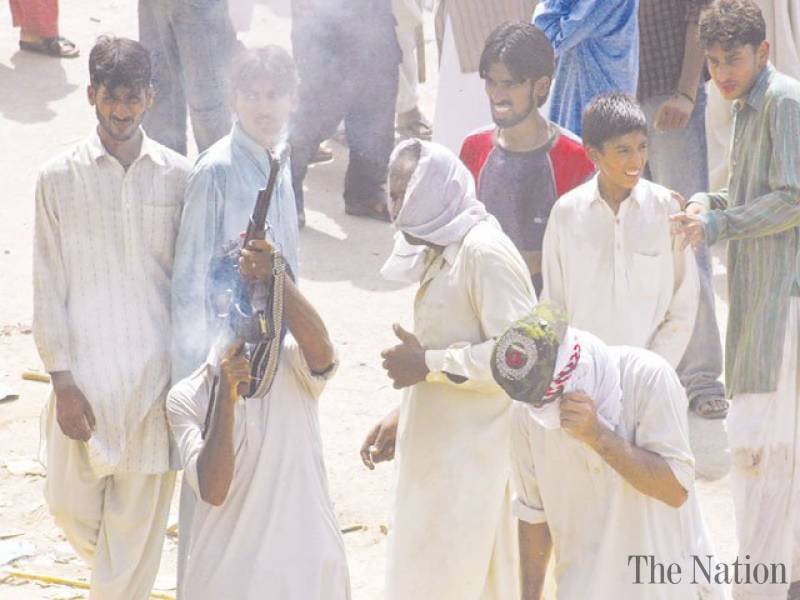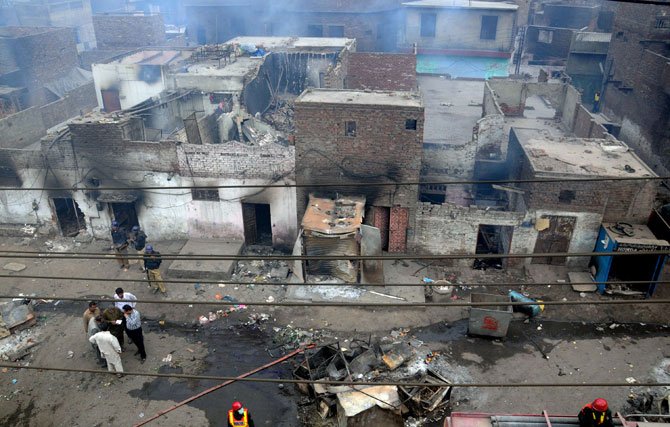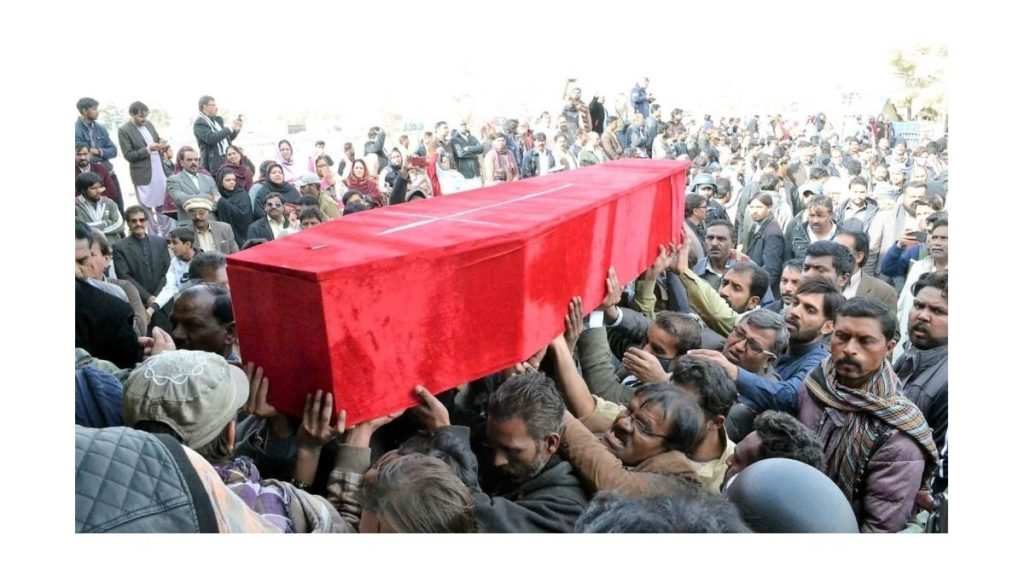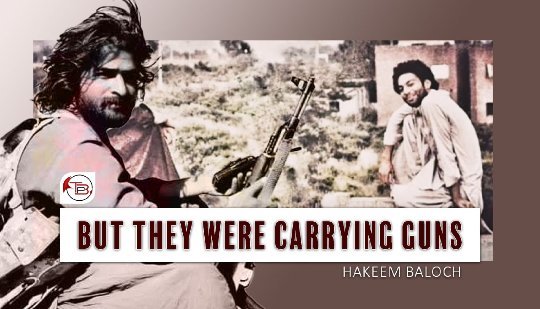Pakistan is always begging money and Foreign Aid from the West which is predominantly Christian. One of the Journalists recently questioned Pakistan Prime Minister Imran Khan on the Begging Bowl Syndrome. What for Pakistan need the funds? Did the Politicians in US and Europe look at the conditions of Christians in Pakistan before funding FATF Grey Listed Pakistan? Should Christian countries give Foreign Aid to Pakistan where Islamist Radicals hate all non-muslims equally as they hate other ethnic minorities of Baloch, Pashtun, Sindhi, Muhajir, Ahamadiya, Sufi, Hazaras?
Pakistan’s dealings with the Christian minority fares no better than the oppressive treatment meted out to the other religious and ethnic groups. Pakistan’s Christians have been subjected to all kinds of brutalities be it falsely implicated blasphemy charges, murders, arson, destruction of properties, convictions and forceful exiles.
We recently covered the topic of persecution of religions minorities of Christians and Hindus and other ethnic groups of Baloch, Pashtun, Muhajir, Sindhi, Ahamadiyas in details in our earlier article titled “IMF Bailout Loan To Pakistan: Throwing Public Money In Drain”
Radical Islamist Violence Against Christians
Ayub Masih, a Christian, was convicted of blasphemy and sentenced to death in 1998. He was accused by a neighbor of stating that he supported British writer Salman Rushdie, author of The Satanic Verses. Lower appeals courts upheld the conviction. However, before the Pakistan Supreme Court, his lawyer was able to prove that the accuser had used the conviction to force Masih’s family off their land and then acquired control of the property. Masih has been released
On 9 August 2002 gunmen threw grenades into a chapel on the grounds of the Taxila Christian Hospital in northern Punjab 15 miles west of Islamabad, killing four, including two nurses and a paramedic, and wounding 25 men and women.
On September 25, 2002, unidentified Islamist Radical gunmen shot dead 6 people at a Christian charity in Karachi’s central business district. They entered the third-floor offices of the Institute for Peace and Justice (IPJ) and shot their victims in the head. All of the victims were Pakistani Christians. Karachi police chief Tariq Jamil said the victims had their hands tied and their mouths had been covered with tape.
On 25 December 2002, several days after a Radical Islamic cleric called for Muslims to kill Christians, two burqa-clad Islamist Radical gunmen tossed a grenade into a Presbyterian church during a Christian sermon in Chianwala in east Pakistan, killing three girls.
After the Karachi killings, Shahbaz Bhatti, the head of the All Pakistan Minority Alliance, told BBC News Online, “We have become increasingly victimized since the launch of the US-led international War on Terror. It is, therefore, the responsibility of the international community to ensure that the government protects us.”
In November 2005, 3,000 Islamist Radicals attacked Christians in Sangla Hill in Pakistan and destroyed Roman Catholic, Salvation Army and United Presbyterian churches. The attack was over allegations of violation of blasphemy laws by a Pakistani Christian named Yousaf Masih. The attacks were condemned by some political parties in Pakistan. However, Pakistani Christians have expressed disappointment that they have not received justice. Samson Dilawar, a parish priest in Sangla Hill, said the police have not committed to trial any of those arrested for committing the assaults, and the Pakistani government did not inform the Christian community that a judicial inquiry was underway by a local judge. He said that Radical Islamist clerics still “make hateful speeches about Christians” and “continue insulting Christians and our faith”.
In February 2006, churches and Christian schools were targeted in protests over publication of the Jyllands-Posten cartoons in Denmark, leaving two elderly women injured and many homes and much property destroyed. Some of the mobs were stopped by police, but not all.
On June 5, 2006, a Pakistani Christian stonemason named Nasir Ashraf was working near Lahore when he drank water from a public facility using a glass chained to the facility. He was immediately assaulted by Islamist Radicals for “polluting the glass”. A mob gathered and beat Ashraf, calling him a “Christian dog”. Bystanders encouraged the beating, saying it was a “good” deed that would help the attackers get into heaven. Ashraf was hospitalized.
In August 2006, a church and Christian homes were attacked in a village outside of Lahore in a land dispute. Three Christians were seriously injured and one reported missing after about 35 Islamist Radicals burned buildings, desecrated Bibles and attacked Christians.
Based, in part, on such incidents, Pakistan was recommended by the U.S. Commission on International Religious Freedom (USCIRF) in May 2006 to be designated as a “Country of Particular Concern” (CPC) by the Department of State.
On September 22, 2006, a Pakistani Christian named Shahid Masih was arrested and jailed for allegedly violating Islamic “blasphemy laws” in the country of Pakistan. He is at present held in confinement and has expressed fear of reprisals by Islamic fundamentalists. (Note that the name “Masih”, which comes from Arabic المسيحيين Al-Masihiyyin, “Christians”, is a common surname in Pakistan and India among Christians.)
In July 2008, a mob stormed a Protestant church during a prayer service on the outskirts of Pakistan’s largest city, Karachi, denouncing the Christians as “infidels” and injuring several, including a pastor.
In June 2009, International Christian Concern also reported the rape and killing of a Christian man in Pakistan, for refusing to convert to Islam.

The August 2009 Gojra riots was a series of violent pogroms against Christian minorities by Islamist Radicals. On 1-August 2009, 8 Christians were burnt alive and 18 injured in Gojra after violence erupted in the town over the alleged desecration of the Holy Quran three days ago. 60 houses were set on fire and a Church was damaged by an angry mob. According to sources, most of the houses were burnt by a group of youths who had their faces covered with veils. They threw petrol bombs and fired indiscriminately.
Of the 1,000 accused in the 2009 horrific Gojra riots, where 8 Christians were burnt alive and 60 houses torched, not even one has been convicted. All the accused were released on bail after the petitioners and witnesses were pressured to withdraw their statements and file affidavits in favor of the accused. As a result, the complainants stated that the accused were named by mistake and had no role in the incident.
In November 2010, Asia Bibi was sentenced to death by hanging for “blasphemy”; the sentence has to be upheld in higher court before it can be executed. Bibi was acquitted in 2018.
In March 2011, Shahbaz Bhatti was killed by gunmen after he spoke out against Pakistan’s blasphemy laws. The UK increased financial aid to the country, sparking criticism of British foreign secretary William Hague. Cardinal Keith O’Brien stated, “To increase aid to the Pakistan government when religious freedom is not upheld and those who speak up for religious freedom are gunned down is tantamount to an anti-Christian foreign policy.” The Catholic Church in Pakistan requested that Pope Benedict declare martyrdom of Shahbaz Bhatti.
At least 20 people, including police officials, were wounded as 500 Muslim demonstrators attacked the Christian community in Gujranwala city on 29 April 2011, Minorities Concern of Pakistan has learnt.
During a press conference in Karachi, the largest city of Pakistan, on 30 May 2011, Maulana Abdul Rauf Farooqi and other clerics of Jamiat-Ulema-e-Islam quoted “immoral Biblical stories” and demanded to ban the Bible. Maulana Farooqi said, “Our lawyers are preparing to ask the court to ban the book.”
In August 2012, Rimsha Masih, a Christian girl, reportedly 11 or 14 years old, and an illiterate with mental disabilities was accused of blasphemy for burning pages from a book containing Quranic verses. The allegation came from a Radical Islamist cleric who himself has subsequently been accused by the police of framing the girl. The girl, and later the cleric, were both arrested and released on bail.
On 23 September 2012, a mob of protesters in Mardan, angry at the anti-Islamic film Innocence of Muslims, reportedly “set on fire the church, St Paul’s high school, a library, a computer laboratory and houses of four clergymen, including Bishop Peter Majeed.” and went on to rough up Zeeshan Chand, the pastor’s son.
On 12 October 2012, Ryan Stanton, a Christian boy of 16 went into hiding after being accused of blasphemy and after his home was ransacked by a crowd. Stanton stated that he had been framed because he had rebuffed pressures to convert to Islam.

In 9-March 2013, Radical Islamists attacked a Christian neighborhood in Lahore, where 125 houses were burned after a Christian was alleged to have made blasphemous remarks. Thousands of protesters armed with sticks, clubs and stones ransacked Joseph Colony, which is surrounded by iron warehouses, and then set 125 residential properties, some Shops, a Church as well as some motorcycles and rickshaws on fire.
On 22 September 2013, 75 Christians were killed in a suicide attack at the historic All Saints Church in the old quarter of the regional capital, Peshawar.
On 14 February 2014 Islamist Radicals stormed the Church building and attacked school property in Multan. They were led by Anwar Khushi, a Muslim gangster who struck a deal with the local people’s spokesperson. They seized the Church property and displaced the people and deprived them of their building. Since 2014, the Capital Development Authority (CDA), a public benefit corporation responsible for providing municipal services in Islamabad, has been targeting and demolishing illegal slums who are largely occupied by Christians in the city. The Supreme Court put on hold the demolitions and ordered from the CDA a written justification to it. The CDA’s replied that “Most of these katchi abadies [slums] are under the occupation of the Christian community.” “It seems this pace of occupation of land by Christian community may increase. Removal of katchi abadies is very urgent to provide better environment to the citizens of Islamabad and to protect the beauty of Islamabad.” Various human rights activists condemned the response.
On 15-March 2015, two blasts took place at a Roman Catholic Church and a Christ Church during Sunday service at Youhanabad town of Lahore. At least 15 people were killed and seventy were wounded in the attacks.
On 27-March 2016, at least 70 were killed and over 340 wounded when a suicide bomber targeting Christians celebrating Easter attacked a playground in Lahore. The Pakistani Taliban claimed responsibility for the bombing.

On 17-December 2017, a bomb killed 9 and injured 57. Worshipers were lining up to take communion on Sunday morning when four Islamist Terrorists, armed and wearing suicide vests, attacked Bethel Memorial Methodist Church in western Pakistan’s provincial capital city Quetta. They were equipped with ample ammunition supply and were aiming to take worshipers hostage and kill them one by one, prolonging the scene of terror as much as they could.

One Terrorist was shot dead. One entered the church and blew himself that left at least 11 dead and more than 50 injured, many in critical condition. Two Terrorists escaped. Pakistan based IS claimed the responsibility of the suicide attack.
Current European Union Policies toward Pakistan
The sufferings of Pakistan’s Christian community were brought to light on 26 June 2019, by Italian Parliamentary Group’s international conference held at the Chamber of Deputies of Rome.
An Italian interparliamentary group held a conference in Rome on June 26, shedding light on the failure of Western countries — and especially the European Union — to address human-rights abuses.
It was mentioned during the conference that Pakistan exports more than 7 billion items to the European market without paying custom duties.
“Given the vital importance of such agreement for Pakistan, which represents around 40% of all of its exports, the EU has an instrument at its disposal that would be very likely to convince Pakistani authorities to abolish this law, or at least to relax it,” Malosse told the Register, adding that the EU grants such commercial preferences only if a country complied with 27 international conventions on political and religious human rights. He noted that Pakistan’s government in Islamabad has yet to respect these conventions.
On June 26, an international conference held at the Chamber of Deputies of Rome brought a laser-like focus to this continued persecution of Pakistani Christians, who represent 2.5% of the Pakistani population, according to CIA World Factbook. The conference was sponsored by an Italian interparliamentary group dedicated to defending religious freedom for Christians around the world.
“There are political and economic interests at stake, as Pakistan is actually blackmailing the European powers,” he said, explaining that if European countries moved to restrict imports, Pakistani authorities threatened to influence the Taliban in Afghanistan in order to provoke attacks against the European forces there and to draw themselves closer to China, Europe’s main trade competitor. “Europe concedes to threats, and, in the meantime, dozens of thousands of Christians and other minorities are suffering in Pakistan.”
On June 21, U.S. Secretary of State Mike Pompeo urged Pakistan to do more on religious freedom and to stop the abuse occurring under cover of its blasphemy laws. He also encouraged the Pakistani government to appoint an envoy to address religious-freedom concerns.
Among Europe’s other failures to address human-right issues in Pakistan mentioned during the conference, speakers also pointed to the lack of media coverage on the situation of Christians in the country.
“The Eastern Christians received media attention only in Syria, because of the war,” he told the Register. “But in Pakistan, their suffering is not caused by war, but by discriminatory policies coming from the government in power.”
“We must insist,” he said, that the Pakistan government be held accountable for its record of abuses.
Human Rights Warning for Pakistan
WESTT approached Member of the European Parliament (MEP) Marijana Petir who also attended the protest, to call on other MEPs to write to the Prime Minister of Pakistan and insist that the persecution of religious minorities in Pakistan is stopped, in accordance with the Freedom of Religion Covenant already signed and ratified by Pakistan in 2010.
Pakistan ratified the Covenant and undertook, in both international law and treaties, to impart legal justice for the values and rights incorporated therein and protect its people by national legislation against cruel, inhumane or degrading treatment by State agencies. By signing, Pakistan recognized that “… the Covenant prohibits slavery, guarantees the right to a fair trial and protects the persons against arbitrary arrest or detention. It recognizes freedom of thought, conscience and religion; freedom of opinion”.
On 30 April, Petir and fifty other MEPs co-signed a letter to Mr Imran Khan, Prime Minister of the Islamic Republic of Pakistan, setting out that unless the violations of the Covenant and the persecution of religious minorities is stopped immediately, the co-signatories would call on the European Commission to cease all subsidies until assurances could be given that no further violations would be committed.
WESTT additionally received a letter from the human rights committee of the European Parliament (DROI) stating that “The European Parliament has consistently stressed the importance of the right to freedom of religion or belief, and specifically voiced concerns regarding the blasphemy legislation in Pakistan in a number of resolutions adopted since 2014. Members have placed much emphasis on the fact that blasphemy laws can affect people of all faiths in the country and that such laws have been increasingly used to target vulnerable minority groups, including Ahmadis and Christians. This point is all the more important, given the fact that Pakistan’s constitution guarantees freedom of religion and minority rights.”
The European Parliament Human Rights Committee highlighted that “The instrumentalisation of religious issues for political ends is a trend of great concern for Parliament, as are all acts of harassment or social pressures against any individual or group of people on the grounds of thought, conscience, religion or belief. As a matter of principle and policy, Parliament has always condemned all acts of violence against religious communities, as well as all forms of discrimination on the grounds of religion and belief. It will remain committed to addressing all human rights violations and will use every suitable opportunity to raise these issues with all relevant counterparts.”
The continued violation of international Covenants Pakistan where Hindu, Sikh and Christian religious minorities, face multiple forms of discrimination and persecution, it would appear that the European Union, as the beacon for human rights, will need to move beyond resolutions to be effective. As the letter of the European parliament eluded, suspension of trade benefits, subsidies, stopping all Foreign Aid and even sanctions are more likely to be on the cards in the future.
History of Persecution of Christians
Pakistan was formed in 1947. Christians in Punjab and Sindh had been quite active after 1945 in their support for Muhammad Ali Jinnah’s Muslim League. Leading Indian Christians like Pothan Joseph had rendered valuable services as journalists and propagandists of the Muslim League. Jinnah had repeatedly promised all citizens of Pakistan complete equality of citizenship, but this promise was not kept by his successors. Pakistan became an Islamic Republic in 1956, making Islam the source of legislation and cornerstone of the national identity. Pakistani Punjab is now over 2% Christian, with very few Hindus left.
In the 1980s and 1990s tensions between Christians and Muslims in Pakistan began to “fester”. The Soviet war in Afghanistan, the rise of military dictator General Mohammed Zia ul-Haq, and the influence of stricter religious teachings coming from the Gulf states were the catalysts for the change. With the governments of Zulfikar Ali Bhutto and Zia ul-Haq, more stringently Islamic laws transformed Pakistan. Zia also introduced the Sharia as a basis for lawmaking, reinforced by Nawaz Sharif in 1991.
Pakistan’s Christian community developed a “growing sense of concern”, particularly over the strict blasphemy laws – which restricts any insults against the Islamic prophet Muhammad and makes the crime punishable by death – which many activists viewed as “being abused to target religious minorities. Blasphemy laws made it treacherous for non-Muslims to express themselves without being accused of being un-Islamic. Coerced conversions to Islam from Christianity are a major source of concern for Pakistani Christians, and the minority faces threats, harassment and intimidation tactics from extremists.
In the 1990s, some Christians were arrested on charges of blasphemy, and for protesting that appeared to insult Islam. John Joseph, a bishop in Faisalabad, committed suicide to protest the execution of a Christian man on blasphemy charges.
Pakistani law mandates that any “blasphemies” of the Quran are to be met with punishment. On July 28, 1994, Amnesty International urged Pakistan’s Prime Minister, Benazir Bhutto to change the law because it was being used to terrorize religious minorities. She tried but was unsuccessful. However, she modified the laws to make them more moderate. Her changes were reversed by the Nawaz Sharif administration. Some people accused of blasphemy have been killed in prison or shot dead in court, and even if pardoned, may remain in danger from imams in their local village.
In 2016, it was reported that Pakistan Electronic Media Regulatory Authority (PEMRA) had banned all the Christian television stations. PEMRA doesn’t allow landing rights for religious content, allowing airing of Christian messages only on Easter and Christmas. Now we do not expect any News of persecution or attacks on Christians to be reported by Pakistan Media which is now under the strict control and censorship of Pakistan Army.
Conclusion
Pakistan is intolerant of the Christians just like other religious minorities like Hindus and ethnic groups like Baloch, Pashtuns, Sindhis, Muhajirs, Ahamadiyas, Hazaras. Pakistan is the Terrorist Producing Factory of the world. All major Terrorist attacks in the whole world has roots in Pakistan. All Top Most Wanted Terrorists of the world are in Pakistan. Even Osama Bin Laden was found in Pakistan. Pakistan is killing the US soldiers in Afghanistan through their proxies Taliban. Christian Organizations worldwide are demanding that the US and Europe must stop feeding the Islamist Radicals and stop all Foreign Aid immediately. As per Christian Organizations, US and Europe must work together to sanction Pakistan for Human Rights Abuses and persecuting religious minorities and ethnic groups of Baloch, Pashtun, Muhajir, Sindhi, Ahamadiyas.
Points to Ponder
Europe and UK allowed millions of Islamist Radicals as Refugees. Those Islamist refugees have made the life of Christians hell in EU and UK. They are involved in all sort of crimes. Women and daughters are not safe. Instead of inviting the Islamist Radicals, shouldn’t, these Christian Minorities been the best fit to be taken in as Refugees instead?
The total number of Christians in Pakistan was estimated at 2.5 million in 2005, or 1.6% of the population. 3.2 million i.e. 3,237,893 (2017) 1.6% of the Pakistani Population are Christians. If all the Christians from Pakistan are migrated and settled in Europe, Pakistan will have no connection left with Christianity. Whole Christian world can than boycott Pakistan and stop all the Foreign Aid to the FATF Grey Listed Pakistan. Christians will assimilate well with Europeans being from the same religion. If European Union, UK want, they can instead migrate 2.5 million Islamist refugees to Pakistan in an exchange of Refugee program. Islamist Refugees would gel well in Pakistan which itself is a Radical Islamist Nation.
Follow us at:-
Twitter Handle: @communique_news
Parler Handle: @newscommuniquecom






